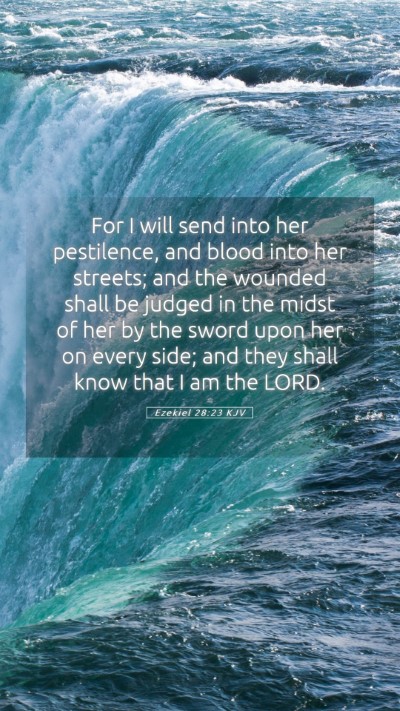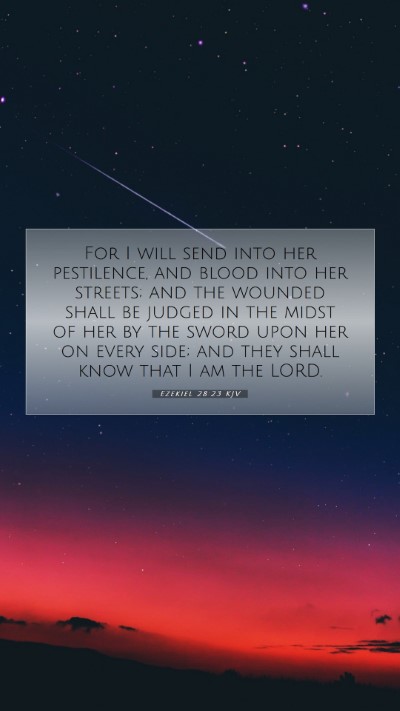Bible Verse Meaning: Ezekiel 28:23
Ezekiel 28:23 states: "And I will send a pestilence upon her, and blood shall be in her streets, and the wounded shall be judged in the midst of her, by the sword upon her on every side; and they shall know that I am the LORD." This verse encapsulates God's judgment against Tyre, symbolizing broader themes of divine retribution and the consequences of sin.
Understanding Ezekiel 28:23
This verse forms part of a broader prophetic announcement by Ezekiel concerning the fate of Tyre, a city known for its pride, prosperity, and idolatry. The following insights can be gleaned from public domain commentaries:
-
Matthew Henry's Commentary:
Henry emphasizes the inevitability of God's judgment, warning that nations and individuals who indulge in pride and rebellion against God will face His wrath. The "pestilence" signifies divine punishment that brings physical and moral decay to a once-thriving city.
-
Albert Barnes' Notes:
Barnes focuses on the vivid imagery of desolation and death; "blood shall be in her streets" symbolizes the violence and strife resulting from God's judgment. The notion of the "wounded" being judged could imply that even those who seem untouchable will face consequences for their actions, showcasing the impartiality of divine justice.
-
Adam Clarke's Commentary:
Clarke interprets the pestilence not just as a literal disease but as a metaphor for God’s pervasive judgment, impacting the heart and soul of the inhabitants. He notes that the outcomes of such judgments serve as a reminder to all nations of the consequences of opposing God’s will.
Key Themes and Insights
The verse offers a multifaceted understanding that combines historical, spiritual, and theological reflections:
-
Divine Sovereignty:
This verse illustrates God's authority over nations. The phrase "they shall know that I am the LORD" underlines that God's actions are meant to draw awareness to His sovereignty and power, even in judgment.
-
Consequences of Sin:
Ezekiel 28:23 serves as a stark reminder of the repercussions that arise from a community's collective sin, as well as the destructive nature of pride and idolatry.
-
Judgment and Mercy:
While primarily a declaration of judgment, this verse can also prompt reflections on God's mercy; acknowledging judgment may lead individuals or nations back to seek repentance and restoration.
Applying Ezekiel 28:23 Today
The insights from this verse provide valuable lessons for modern audiences:
-
Self-Examination:
Individuals are encouraged to reflect on personal and societal pride and idolatry, understanding that consequences may follow straying from God's principles.
-
Community Responsibility:
This verse highlights the moral responsibilities of communities. Collective actions have repercussions, urging societies to pursue righteousness and justice.
-
Hope in Judgment:
For believers, this verse reinforces the hope that God's ultimate plan includes redemption, even amid judgment. It invites a deeper trust in divine justice.
Related Bible Cross References
- Isaiah 23:1-18: A prophecy concerning the destruction of Tyre.
- Jeremiah 47:1: A declaration against the Philistines, illustrating God’s sovereignty over nations.
- Ezekiel 26:19-21: A detailed prediction of the destruction of Tyre and its implications.
This comprehensive analysis of Ezekiel 28:23 serves as a profound reminder of the need for divine reverence, encouraging believers and Bible study groups to delve into Scripture analysis, facilitating a deeper understanding of Scripture and the Bible study lessons that emerge from engaging with challenging verses.


